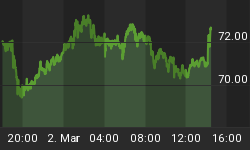A March 16 article reported the "The Eurozone's temporary bailout fund has paid out a 26.6 billion euro (about U.S.$35 billion) sweetener for Greek bondholders involved in the stricken country's debt swap". You can read the article for more details.
One has to seriously wonder why such a payment would be made from what, in the end, has to be Eurozone (and perhaps European and perhaps even non-European) country taxpayers to private sector bondholders. The article says the amount could rise to 30 billion euros. Private sector investors typically 'pay their money and take their chances'. For me, that such a payment is being made is tantamount to falling backward into what I think is the 'too big to fail' sinkhole. It seems to me there must be huge 'financial sector' risks perceived by the Euro Governments and Governments generally, or such a payment would not be even considered - let alone made. Hence the title of this commentary: 'When Does Fiat Currency Run Out?'. I believe the theoretical answer is 'never'. I believe the practical answer can be found in a statement attributed to Gordon Moore, the inventor of Moore's Law. While Mr. Moore was referring to growth of something specific, I think the "it" in the following statement can fairly be said to broadly apply.
"It can't continue forever. The nature of exponentials is that you push them out and eventually disaster happens."
Stated differently, if things continue to grow and get ever heavier, they eventually collapse under their own weight.
As an aside, I see this as the biggest problem with government, economist, and market focus on % increases and decreases in economic metrics (for example, GDP), as it has always seemed to me that perpetual growth rates imputed into things are nigh impossible - whereas growth or declines in absolute $ may be less so.
Notes (from or based on Wikipedia definitions):
- Moore's Law is a rule of thumb in the history of computing hardware whereby the number of transistors that can be placed inexpensively on an integrated circuit doubles approximately every two years;
- an exponential is something that grows exponentially, or geometrically if it grows at a consistent compound rate over the same chronological intervals. Think of geometric growth as 'perpetual growth' - something that I believe most, me included, would think is theoretically possible, but impossible as a practical matter.
Read: 26.6bn Euro 'sweetener' paid to Greek bondholders. Source: The Telegraph, Angela Monaghan, March 16, 2012. Reading time 4 minutes.
You might want to read a second March 16 article that speaks to collaboration perceived by some between politicians and bankers that has been, and is, occurring at the expense of taxpayers.
Read: So Far, the Bankers Win. Source: The Financial Sense Blog, Danielle Park, March 16, 2012. Reading time 2 minutes, Watching and listening time of the Bloomberg video that accompanies this second article 4.7 minutes.
















